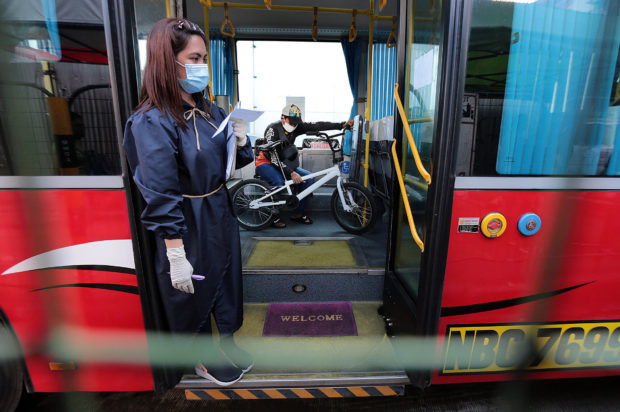
FILLING THE GAP With the operations of the Metro Rail Transit (MRT) 3 suspended until Saturday due to the growing number of train employees testing positive for the coronavirus, the Department of Transportation is deploying 90 buses that will pick up commuters at selected MRT 3 stations on Edsa. —GRIG C. MONTEGRANDE
MANILA, Philippines — Good news for airlines, barbershops, hair salons and spas.
Restrictions on grooming services, in places like barbershops and hair salons, in general community quarantine (GCQ) and modified GCQ (MGCQ) areas have been relaxed.
Filipinos may also start leaving the country this month for nonessential travel and tourism, but they should have roundtrip tickets and adequate travel health insurance, and must execute a waiver on the risks of traveling.
The green light to travel abroad came after the Inter-Agency Task Force for the Management of Emerging Infectious Diseases (IATF) lifted the suspension of nonessential travel and all travel restrictions on outbound travel. It will take effect 15 days after IATF Resolution No. 52 is published in the Official Gazette.
Five requirements
The resolution requires Filipinos going on nonessential travel outside of the country to comply with five requirements.ʎ Submit confirmed round-trip tickets for those traveling on tourist visas.
- Get adequate travel and health insurance to cover rebooking and accommodation expenses if stranded, and hospitalization in case of infection. The amount will be determined by the Department of Tourism.
- Secure entry permission from the destination country in accordance with its travel, health and quarantine restrictions.
- Execute a declaration acknowledging the risks of travel, including delays in returning home. The declaration form will be provided by the airlines at the check-in counter.
- Follow, upon return to the country, guidelines on homebound overseas Filipinos set by the National Task Force on COVID-19, such as mandatory quarantine and testing for the new coronavirus.
“All of the foregoing is without prejudice to the exercise of the mandate of the Bureau of Immigration prior to departure,” read the IATF resolution.
At a press briefing on Tuesday, presidential spokesperson Harry Roque initially said outbound tourism was still not allowed. But in a later text message to reporters, he clarified the statement, saying it will be “allowed subject to the conditions set by the IATF’s resolution.”
Deployment of health workers
The ban on deployment of health-care workers to other countries remains in place, however, he said.
The IATF first banned nonessential travel of Filipinos to other countries and local tourism activities in March at the start of the lockdown, severely crippling the aviation industry.
Its resolution, approved on Monday, is the latest move to ease restrictions placed on Filipinos’ movement amid the pandemic.
On June 1, Metro Manila transitioned into GCQ after more than two months of lockdown.
On Tuesday, Roque also released the Department of Trade and Industry’s updated guidelines on grooming services, such as barbershops and salons.
At present, barbershops and hair salons in GCQ areas may offer all haircut and all hair-treatment services at 30-percent capacity until July 15.
By July 16, the operating capacity of barbershops and salons in GCQ areas will be increased to 50 percent, provided the venue’s capacity allows physical distancing and the establishment is compliant with prescribed health measures.
For barbershops and hair salons in MGCQ areas, the following services may be offered: all haircut services; hair-treatment services; nail-care services; basic facial care, such as makeup, eyebrow threading, eyelash extension and facial massage; and basic personal care services, such as waxing, threading, shaving, and foot and hand spas.
These services should comply with strict measures on hand sanitation, wearing of face masks, face shields and gloves, and use of sterilized equipment.
Barbershops and hair salons in MGCQ areas will continue operating at 50-percent capacity until July 15. The capacity will be increased to 75 percent by July 16.
Health protocols
The establishments must implement mandatory health standards and protocols, Roque said.
These are:
- No face mask, no entry policy.
- Provisions for rubbing alcohol.
- Registration with SafePass, StaySafe.Ph or imposing a health declaration checklist for contact tracing.
- Thermal scanning before entry and refusing entry to clients with a temperature higher than 37.5 degrees.
- Declining entry to clients with cough, cold or breathing difficulty.
- One-meter distance on all sides for chairs to be occupied.
- Appropriate ventilation and exhaust system and properly sanitized and trash-free restroom in the establishment.
- Sterilization of equipment or tools and workstations before and after each service.
- Declining entry to clients’ companions, unless absolutely necessary.